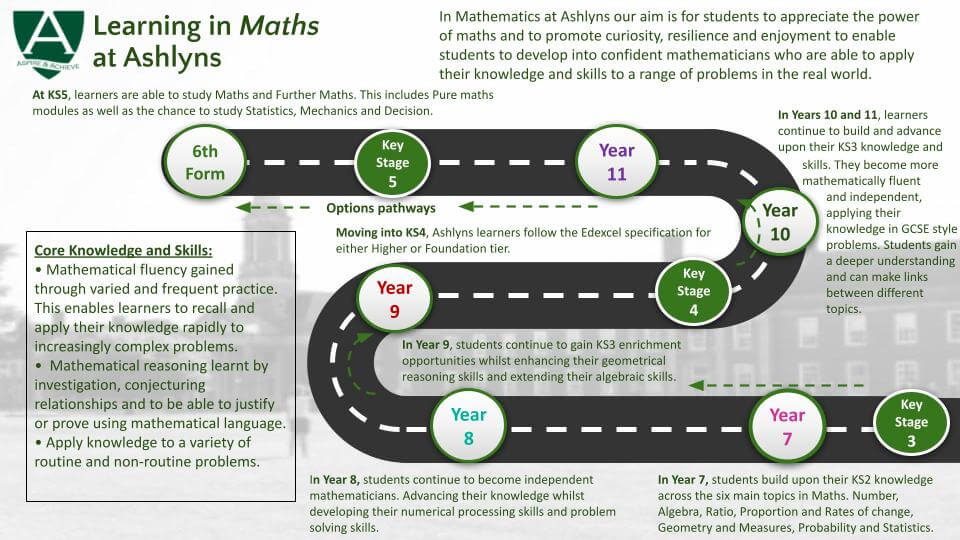Maths

In Mathematics at Ashlyns, our aim is for students to appreciate the power of maths and to promote curiosity, resilience and enjoyment to enable students to develop into confident mathematicians who are able to apply their knowledge and skills to a range of problems in the real world. We aim to achieve this by students:
- becoming fluent in mathematics through varied and frequent practice, so that they are able to recall and apply their knowledge rapidly to increasingly complex problems.
- being able to reason mathematically by investigation, conjecturing relationships and to be able to justify or prove using mathematical language.
- applying their knowledge to a variety of routine and non-routine problems with increasing sophistication
Our spiralling curriculum aims to deepen understanding thus allowing students to explore and study new concepts using prior knowledge and for students to appreciate the interconnected nature of mathematics. We strive for all students to acquire the knowledge and skills to achieve their potential and aim to provide a supportive and nurturing environment and to stretch and challenge at all levels.
Key Stage 3
In Key Stage 3, students follow a scheme of work based on the National Curriculum, delivered via 3 tiers, dependent on ability, so they study at a level that allows them to make progress. The content of the curriculum builds on the knowledge and skills they have acquired at KS2. Topics are taught in units with an assessment at the end of each unit.
All students will:
- continue to develop their numerical processing skills, using written and mental methods
- enhance their geometrical reasoning skills and their ability to break down complex problems into simpler parts and be able to explain and communicate effectively the methods used to arrive at the solution
- extend their algebraic skills to include more complex concepts in preparation for the GCSE curriculum
Key Stage 4
Students build on the knowledge and skills they have acquired at KS3. All students study GCSE mathematics following the Edexcel Specification, a linear course delivered over two years.
The GCSE Mathematics course is divided into two tiers – Higher (Grades 4 -9) and Foundation (Grades 1-5). Tier of entry is decided on an individual basis to give students the best chance of success. For both tiers, the content of the course is split into six main topics: Number, Algebra, Ratio, Proportion and Rates of change, Geometry and Measures, Probability and Statistics.
We aim to enable students to:
- develop fluent knowledge, skills and understanding of mathematical methods and concepts
- acquire, select and apply mathematical techniques to solve problems
- reason mathematically, make deductions and inferences, and draw conclusions
- comprehend, interpret and communicate mathematical information in a variety of forms appropriate to the information and context
Key Stage 5
In Key Stage 5, we aim for students to understand mathematical processes in a way which fosters students’ enjoyment of mathematics and promotes confidence to provide them with a strong foundation for progress to further studies.
For A level Mathematics, we follow the Edexcel specification studying Pure Mathematics, Statistics and Mechanics. In Pure Mathematics, students advance their algebraic and geometric skills and are introduced to calculus, logarithms and more complex trigonometry. In Statistics students study methods of representing and analysing data, probability and hypothesis testing. These concepts are studied along with the analysis of a given large data set. In Mechanics students are introduced to techniques to mathematically model problems involving forces and movement.
For A level Further Mathematics, we follow the Edexcel specification studying the Pure Mathematics required for all specifications and the options of Further Mechanics and Decision Mathematics. In Pure Mathematics, students are introduced to complex numbers and matrices as well as extending their knowledge of calculus and algebra. In Further Mechanics, students broaden their application of mathematical modelling to solve problems involving work, energy and power, elastic springs and advanced collisions. Decision Mathematics allows students to study a completely different area of mathematics: algorithms, graph theory, critical path analysis and linear programming.
Learning beyond the classroom
Students with an interest and aptitude for Mathematics are give the opportunity are entered for the UKMT Maths Challenges, Junior, Intermediate and Advanced. The school also hosts a regional UKMT Team Challenge. There are opportunities for students to attend Maths Inspiration Show, Maths in Action and the Big Bang Fair.

